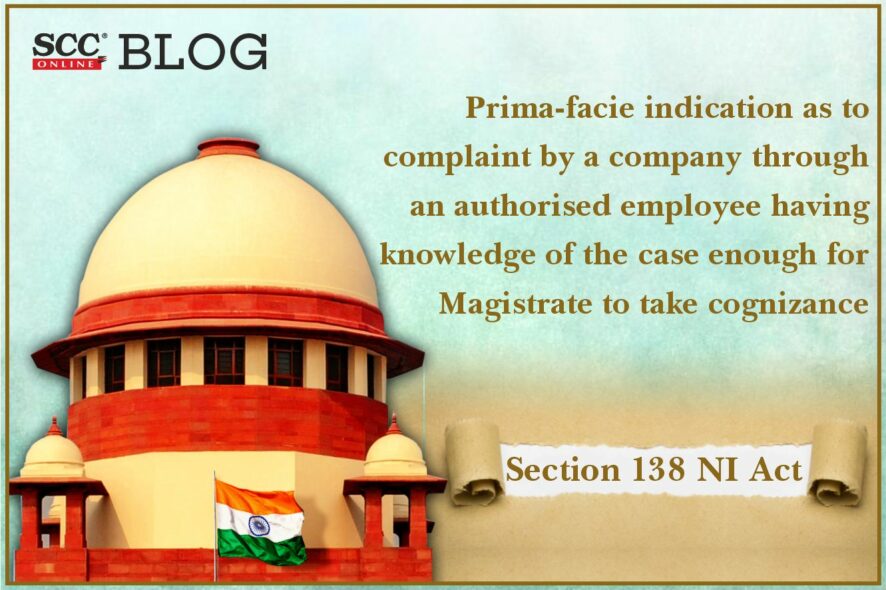Supreme Court: The 3-judge bench of NV Ramana, CJ and AS Bopanna* and Hima Kohli, JJ has held that when the complainant/payee for a complaint filed under Section 138 of NI Act is a company, an authorized employee can represent the company. Such averment need not be in any particular manner and prima facie material is sufficient for the Magistrate to take cognizance and issue process.
In the case at hand the complaint was filed in the name of the company i.e., “the payee”, through it’s General Manager (Accounting). The authorisation by the Managing Director in his favour disclosed that the Managing Director of the appellant company had authorised the General Manager (Accounting) to institute criminal proceedings, including proceedings under the provisions of the N.I. Act and civil proceedings on behalf of the company against SMS Asia Private Limited, to represent the company and take all necessary actions in the matter in learned SDJM’s. Court.
The Managing Director apart from himself being the key managerial personnel of the appellant company, has also been delegated the power by the Board of Directors, for the management and operation of the company and it has been specified among others, to exercise the power relating to important issues affecting the company’s land and property. The Managing Director was also empowered to delegate where necessary and to the extent required, any of the powers delegated to him, to his subordinate officers.
In such circumstances, observing that company having authorized the General Manager (Accounting) who had personal knowledge being clearly averred, the Court explained that,
“What can be treated as an explicit averment, cannot be put in a straitjacket but will have to be gathered from the circumstance and the manner in which it has been averred and conveyed, based on the facts of each case. The manner in which a complaint is drafted may vary from case to case and would also depend on the skills of the person drafting the same which by itself, cannot defeat a substantive right.”
However, what is necessary to be taken note of is as to whether the contents as available in the pleading would convey the meaning to the effect that the person who has filed the complaint, is stated to be authorized and claims to have knowledge of the same. In addition, the supporting documents which were available on the record by themselves demonstrate the fact that an authorized person, being a witness to the transaction and having knowledge of the case had instituted the complaint on behalf of the “payee” company and therefore, the requirement of Section 142 of NI Act was satisfied.
Further, when a company is the payee of the cheque based on which a complaint is filed under Section 138 of NI Act, the complainant necessarily should be the Company which would be represented by an employee who is authorized. Prima¬facie, in such a situation the indication in the complaint and the sworn statement (either orally or by affidavit) to the effect that the complainant (Company) is represented by an authorized person who has knowledge, would be sufficient.
The Court made clear that the employment of the terms “specific assertion as to the knowledge of the power of attorney holder” and such assertion about knowledge should be “said explicitly” as stated in A.C. Narayanan v. State of Maharashtra, 2014) 11 SCC 790 cannot be understood to mean that the assertion should be in any particular manner, much less only in the manner understood by the accused in the case.
“All that is necessary is to demonstrate before the learned Magistrate that the complaint filed is in the name of the “payee” and if the person who is prosecuting the complaint is different from the payee, the authorisation therefor and that the contents of the complaint are within his knowledge.
If at all, there is any serious dispute with regard to the person prosecuting the complaint not being authorized or if it is to be demonstrated that the person who filed the complaint has no knowledge of the transaction and, as such that person could not have instituted and prosecuted the complaint, it would be open for the accused to dispute the position and establish the same during the course of the trial.
The Court, hence, held that dismissal of a complaint at the threshold by the Magistrate on the question of authorisation, would not be justified. Also, entertaining a petition under Section 482 to quash the order taking cognizance by the Magistrate would be unjustified when the issue of proper authorization and knowledge can only be an issue for trial.
[TRL Krosaki Refractories Ltd. v. SMS Asia Private Limited, 2022 SCC OnLine SC 217, decided on 22.02.2022]
*Judgment by: Justice AS Bopanna
Counsels
For appellant: Senior Advocate Ashok K. Parija
For respondent: Advocate Santosh Kumar







